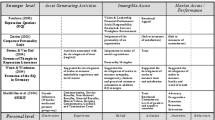Abstract
Contrary to popular belief, reputation does not always remedy market imperfections, but may exacerbate them. This is obvious once it is made clear that as a form of belief corporate reputation is akin to testimony. As such, reputation may subsist on unreliable beliefs. Reputation neither holds market actors to account nor is it a panacea for problems associated with tacit, or incomplete, contracts. Once it is clear that reputation may distort the market, it follows that the way in which firms may profit from reputation is by employing it to maximise the advantages of there being scarce, and imperfect, information in the market. A series of propositions for the strategic deployment of reputation follows from this observation. The critical question facing any corporation that would profit by its reputation is the extent to which it can foster an unjustified reputation before the market catches up with it.
Access this chapter
Tax calculation will be finalised at checkout
Purchases are for personal use only
Preview
Unable to display preview. Download preview PDF.
Similar content being viewed by others
References
Adler P.S. (2001) Market, hierarchy, and trust: the knowledge economy and the future of capitalism. Organization Science, Vol 12 pp 215-234
Allen DW, Lueck D (1992) The “back forty” on a handshake: specific assets, reputation, and the structure of farmland contracts. Journal of Law, Economics, & Organization, Vol 8 pp 366-376
Applebaum B, et al. (13 Dec. 2008) All just one big lie. The Washington Post
Baker WE, Faulkner RR, Fisher GA (1998) Hazards of the market: the continuity and dissolution of interorganizational market relationships. American Sociological Review, Vol 63 pp 147-77
Backus D, Driffill J (1985) Inflation and reputation. The American Economic Review, Vol 75 pp 530-8
Balvers RJ, McDonald B, Miller RE (1988) Underpricing of new issues and the choice of auditor as a signal of investment banker reputation. The Accounting Review, Vol 63 pp 605-22
Banerjee AV, Duflo E (2000) Reputation effects and the limits of contracting: a study of the Indian software industry. The Quarterly Journal of Economics, Vol 115 pp 989-1017
Barney J (1991) Firm resources and sustained competitive advantage. Journal of Management, Vol 17 pp 99-120
Beatty RP (1989) Auditor reputation and the pricing of initial public offerings. The Accounting Review, Vol 64 pp 693-709
Blois KJ (1972) Vertical quasi-integration. The Journal of Industrial Economics, Vol 20 pp 253-72
Bohnet I, Huck S (2004) Repetition and reputation: implications for trust and trustworthiness when institutions change. The American Economic Review, Vol 94 pp 362-66
Boot AWA, Greenbaum SI, Thakor AV (1993) Reputation and discretion in financial contracting. The American Economic Review, Vol 83 pp 1165-83
Chapman D, Newkirk M (8 Feb. 2009) Blakely plant part of firm with humble start. Atlanta Journal-Constitution
Chemmanur TJ, Fulghieri P (1994) Investment bank reputation, information production, and financial intermediation. The Journal of Finance, Vol 49 pp 57-79
Corbett J, Mitchell J (2000) Banking crises and bank rescues: the effect of reputation. Journal of Money, Credit and Banking, Vol 32 pp 474-512
Dejong DV, Forsythe R, Lundholm RJ (1985) Ripoffs, lemons, and reputation formation in agency relationships: a laboratory market study. The Journal of Finance, Vol 40 pp 809-820
Dewall M, Ederington L (2006) Reputation, certification, warranties, and information as remedies for seller-buyer information asymmetries: lessons from the online comic book market. Journal of Business, Vol 79 pp 693-729
Dollinger MJ, Golden PA, Saxton T (1997) The effect of reputation on the decision to joint venture. Strategic Management Journal, Vol 18 pp 127-40
Fear J (2008). Cartels. In: Jones G, Zeitlin J (eds) The Oxford Handbook of Business History. Oxford University Press, Oxford
Fligstein N (1996) Markets as politics: a political-cultural approach to market institutions. American Sociological Review, Vol 61 pp 656-673
Fligstein N (2001) The Architecture of Markets: An Economic Sociology of Twenty-First-Century Capitalist Societies. Princeton University Press, Princeton
Fombrun CJ (1996) Reputation: realizing value from the corporate image. Harvard Business School Press, Boston
Foreman-Peck J (1995) Sleaze and the Victorian businessman. History Today, Vol 45 pp 5-8
Granovetter M (1985) Economic action and social structure: the problem of embeddedness. The American Journal of Sociology, Vol 91 pp 481-510
Kreps DM (1990) Corporate culture and economic theory. In: Alt J, Shepsle K (eds) Perspectives on positive political economy. Cambridge University Press, Cambridge
Podolny JM (1992) A status-based model of market competition. The American Journal of Sociology, Vol 98 pp 829-872
Polanyi K (2001) [1944] The great transformation: the political and economic origins of our time. Beacon, Boston
Sinclair U (1985) [1906] The Jungle. Penguin, New York
Tirole J (1996) A theory of collective reputations (with applications to the persistence of corruption and firm quality). The Review of Economic Studies, Vol 63 pp 1-22
Uzzi B (1996) The sources and consequences of embeddedness for the economic performance of organizations: the network effect. American Sociological Review, Vol 61 pp 674-98
Author information
Authors and Affiliations
Editor information
Editors and Affiliations
Rights and permissions
Copyright information
© 2009 Springer-Verlag Berlin Heidelberg
About this chapter
Cite this chapter
Silberstein-Loeb, J. (2009). Reputation or: How I learned to stop worrying and love the market. In: Klewes, J., Wreschniok, R. (eds) Reputation Capital. Springer, Berlin, Heidelberg. https://doi.org/10.1007/978-3-642-01630-1_3
Download citation
DOI: https://doi.org/10.1007/978-3-642-01630-1_3
Published:
Publisher Name: Springer, Berlin, Heidelberg
Print ISBN: 978-3-642-01629-5
Online ISBN: 978-3-642-01630-1
eBook Packages: Business and EconomicsBusiness and Management (R0)




